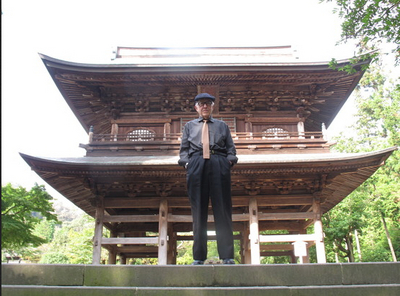More than anyone else, Jeannette Hereniko introduced me to the concept of the cinema of the Pacific Rim. I knew Donald Richie through his books, and in particular learned from him about Ozu. More than anyone else, he was responsible for the introduction of Japanese films to the West, Particularly when he brought a group of great titles to the Venice Film Festival, circa 1960. He also wrote fiction and on Japanese society, and a wonderful autobiographical travel book, The Inland Sea, about a young GI who returned to Japan after WWII and stayed, inspired a film. Here is Jeanette’s appreciation of Donald, who died on Feb. 19. Roger
By Jeannette Hereniko in Hawii
I consider Donald Richie one of the founders of the Hawaii International Film Festival. It was his advice that mattered most to me in selecting guests and films from Japan as well as other places of the world. He is the reason Kashiko Kawakita, Susan Sontag, Nagisa Oshima, Tishuro Mufine, Tadao Sato, among others, came to Hawaii for the Festival. His participation encouraged thousands to be in the audience.
Each year he attended, Donald would escort me to the first meeting of the international jury. In his clear, concise manner he’d instruct the jury on their responsibilities and voting procedures, a method he deemed the best, after decades of serving on film festival juries throughout the world. He set the standard.
He presented lectures, published essays in our program, introduced films, led after film discussions, and analyzed films frame by frame, several times with Roger Ebert. He would write and say things so precisely, so clearly, so poetically, so full of insights that we packed the theaters and learned from him. He opened our eyes so we could see more clearly.
During the 16 years I was Director of the Hawaii International Film Festival from 1981 through 1996, Donald was there for 12 of these years, refusing to come unless he could “do” something to contribute. The Festival’s annual theme was “When Stranger’s Meet” featuring films that examined cross-cultural encounters. The emphasis was on film content and filmmakers, rather than the business of film or movie stars. And all screenings were free. Donald liked this.
When the Festival was over and the reviews came in from around the world, all I really cared about was what Donald wrote in his Japan Times article. His approval determined if we succeeded or not.
Donald’s books, essays, plays, films, artwork, Criterion Collection narrations will live on, and educate future generations about Japan, film and life. However, in addition to being my chief counsel during the years I was at the Hawaii International Film Festival, he was my very dear friend with whom I shared secrets, memories and dreams. When a friend like Donald passes on, something of you also vanishes.












